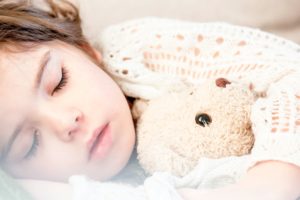Can Children Get Sleep Apnea?
October 16, 2022
 Did you know sleep apnea isn’t just a condition that affects adults? Pediatric sleep apnea is more common than you might realize. There are two types of children’s sleep apnea: obstructive and central. Research has found that up to 11% of children have sleep apnea; however, around 90% aren’t diagnosed because signs of the breathing disorder can be difficult to detect. With 1 in 5 children having obstructive sleep apnea, here’s what you need to know about your child’s risk.
Did you know sleep apnea isn’t just a condition that affects adults? Pediatric sleep apnea is more common than you might realize. There are two types of children’s sleep apnea: obstructive and central. Research has found that up to 11% of children have sleep apnea; however, around 90% aren’t diagnosed because signs of the breathing disorder can be difficult to detect. With 1 in 5 children having obstructive sleep apnea, here’s what you need to know about your child’s risk.
Symptoms of Pediatric Sleep Apnea
Central sleep apnea occurs when the brain sends improper signals to the muscles responsible for breathing. It’s far less common than obstructive sleep apnea, which is caused by an obstruction in the upper airway. Both cause frequent interruptions in breathing through the night, depleting the body of oxygen. While snoring and daytime fatigue are the most common symptoms of sleep apnea in adults, signs can manifest differently for children, like:
- Loud snoring
- Coughing or choking while asleep
- Pauses in breathing
- Breathing through the mouth
- Sleep terrors
- Bedwetting
- Sleeping in odd positions
Symptoms may not just occur at night. It’s not unusual for a child with the disorder to have difficulty waking up in the morning, mood changes, and decreased concentration. Over time, a child can experience learning problems that can lead to poor academic performance. They may also develop hyperactivity. Research has also found a link between pediatric sleep apnea and growth delays, cognitive delays, and obesity. Complications from childhood sleep apnea can even affect them as adults, like an increased risk of heart attacks and strokes.
Treating Childhood Sleep Apnea
Your pediatrician will refer your child for a sleep study to confirm a diagnosis. There isn’t a universal guideline for treating children’s sleep apnea. Symptoms can be mild and may not require any treatment because some cases can resolve on their own. The pediatrician will monitor your child as they grow to weigh the risks of long-term complications with the benefits of treatment.
Treatment can vary depending on the underlying cause. Your pediatrician may recommend:
- Lifestyle Changes: Changes to your child’s diet and increasing physical activity can improve sleep apnea.
- Medications: Nasal steroids or antihistamines can be used to treat congestion to open the airways.
- Surgery: Removing enlarged adenoids or tonsils can resolve obstructions in the airway.
- CPAP: A steady stream of air pressure is delivered through a mask worn over the nose to maintain oxygen levels.
- Oral Appliance: A custom-fit device repositions their tongue or jaw to keep their airway open.
With the right treatment, you will have one less worry on your plate, knowing your child is breathing easily and sleeping peacefully.
About Dr. Angelica Rohner
Dr. Rohner achieved her dental degree from the University of Mississippi School of Dentistry and continued her education for 2 years in pediatric dentistry. She is board certified in pediatric dentistry and is a Diplomate of the American Board of Pediatric Dentistry. If your child needs treatment for sleep apnea, contact our office today to request a consultation.
No Comments
No comments yet.
RSS feed for comments on this post.
Sorry, the comment form is closed at this time.

